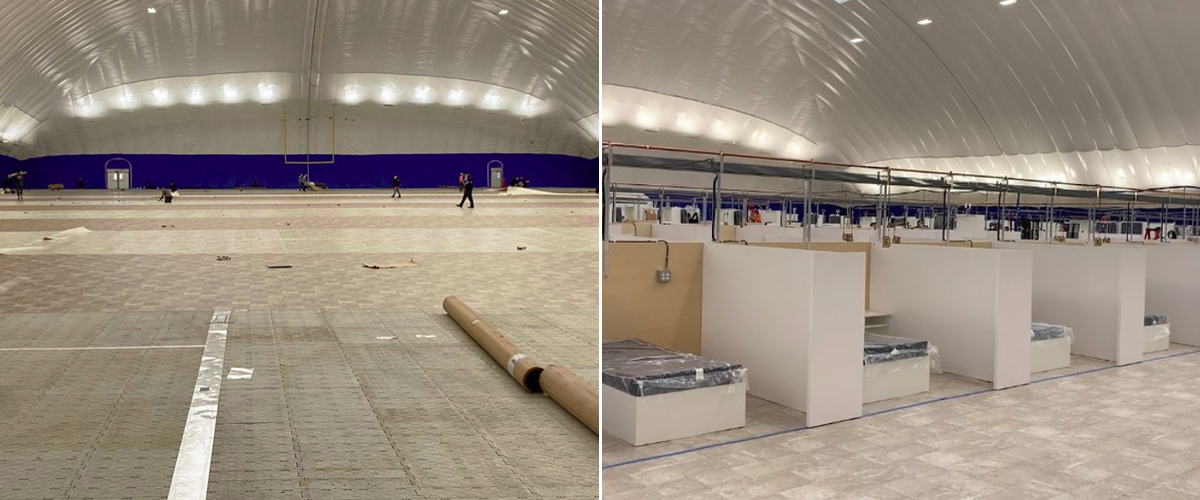Mobilizing to Treat COVID-19 Patients: A Field Hospital is Born
Military veterans answer the call to help NewYork-Presbyterian patients.


Just 10 days ago, NewYork-Presbyterian’s plans to build a field hospital for COVID-19 patients inside the athletic “Bubble” at Columbia University’s Baker Field were just that: plans. Then, Dr. Laureen Hill, the chief operating officer of NewYork-Presbyterian/Columbia University Irving Medical Center, connected with a retired Army Colonel and emergency medicine physician, Dr. Melissa “Missy” Givens, through a friend.
Dr. Hill, who practiced “austere” medicine in Vietnam that included mass casualty experience, outlined the challenge the hospital was facing. They had secured the space for a field hospital thanks to Columbia University, but they didn’t have the medical infrastructure or healthcare professionals to staff it. “I can solve the staffing,” Dr. Givens told Dr. Hill. “If you have the space, I can find the personnel.”
Dr. Givens rallied the troops, and in a matter of days hundreds of veterans had answered the call to serve. This week, the Ryan Larkin Field Hospital will begin treating patients with COVID-19. Located on 218th Street adjacent to NewYork-Presbyterian Allen Hospital in northern Manhattan, the field hospital will be capable of treating more than 216 patients with mild to moderate symptoms.
“This began as a conceptual exercise as we watched our hospitals fill in response to the crisis,” says Dr. Hill. “We went from concept to execution in less than a week.”
To staff the field hospital, Dr. Givens had reached out to a network of Special Operations veterans. Now, nearly 200 medical and support veterans from all parts of the country and branches of service have been trained and credentialed by NewYork-Presbyterian to begin treating patients.
“They’re here on campus, being oriented and onboarded with plans of delivering care here under the direction of Dr. Givens, who has vast experience doing this kind of field hospital operation,” Dr. Hill says.
With this extraordinary collaboration, the field hospital will be staffed largely by former military physicians, nurses, and support personnel. “We’ll be supplementing with our own staff and providing medical oversight and collaboration at both locations,” says Dr. Hill.
A second field hospital, a smaller, 47-bed critical care and step-down unit, will open at Riverview Terrace, a repurposed event space in the Vivian and Seymour Milstein Family Heart Center at 173 Fort Washington Ave., NewYork-Presbyterian/Columbia University Irving Medical Center.
“We see the two facilities as complementary to each other,” says Dr. Hill. “This is how we anticipate being able to pull this off and provide care for the patients we continue to see coming into our hospitals and emergency departments.”
Dr. Givens and Kate Kemplin, DNP, RN, who as head nurse of the operation, will oversee a team that includes physicians, nurses, medics, environmental and transportation personnel, and other support services.
“When you combine two groups of professionals for whom courage, selflessness, and service are a way of life, ‘extraordinary’ happens!”— Dr. Laureen Hill
“This is what the military community is all about,” Dr. Givens says. “This was a resource that was going to waste. This hospital is giving an opportunity to employ these folks and change the paradigm of military medics who leave the service.”
Adds Kemplin, “This is a good opportunity to showcase the incredible clinical expertise of Special Operations medics, whose skills and acumen are really not known in the civilian medical world.”
The hospital admitted its first six COVID patients on Tuesday, while the team also practiced drills and got up to speed with NewYork-Presbyterian systems. Between 75 and 100 additional patients are expected to be admitted over the week. A handful of more seriously ill patients were also admitted at the Riverview Terrace site.
“We wanted to ramp up from a handful of patients to make sure our process for moving patients to the field hospital from our campuses worked well and was safe,” says Paul Dunphey, chief operating officer at NewYork-Presbyterian Allen Hospital. “The field hospital is allowing us to expand our capacity to treat lower acuity covid positive patients, which enables us to increase ICU capacity at our other hospital campuses.”
The project is remarkable for the speed with which it has come together. “About a week ago, the field was still soccer turf,” says Joe Ienuso, group senior vice president for facilities and real estate at NewYork-Presbyterian. Now the 90,000-square-foot space has protective flooring and has been outfitted with electricity, oxygen ports, plumbing, and other critical equipment.
The field hospital is named for decorated Navy SEAL Ryan F. Larkin (1987–2017), who served in Iraq and Afghanistan. “Everyone who knew Ryan commented on what a caring person he was,” says Kemplin. “He was exactly the kind of person who would have set up a tent to treat patients, if he were alive today.”
“This entire effort is really NewYork-Presbyterian at its best,” Ienuso says. “It’s always about serving the community first, and this is a very good example of that.”
Dr. Hill adds, “When you combine two groups of professionals for whom courage, selflessness, and service are a way of life, ‘extraordinary’ happens!”

